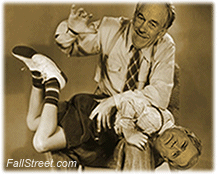|
After signing the ‘American Dream Downpayment Act of 2003’ Bush added, “We want people to be fully aware of what it means to buy a home and what it takes”. The contradiction, if otherwise unclear, was that the President was signing a law that gave free money to those who could not afford to buy a home, and then he planned to educate them about the hard work, savings, and planning that is required to buy a home.
With Wall Street packaging and selling mortgage reset time bombs, rating agencies dolling out A’s first and asking questions never, and many homeowners essentially signing future default notices before their new home purchases were finalized, Bush’s efforts at expanding homeownership since 2003 have gone unnoticed as the subprime debacle widens. Unfortunately, so have the costs of funding Bush’s homeownership initiatives. What should not remain unnoticed is the irony of it all: near the height of the housing boom Bush wanted to do everything he could to boost already record high homeownership rates, but now, as the boom turns to bust, Bush is eying a plethora of emergency policy moves to simply try and keep ownership rates stable. You can not help but wonder whether or not many Americans would have been better off if Bush simply left the mortgage market alone.
Some are wondering exactly that. Notably, United States congressman Ron Paul, who was one of the few who stood up to tackle what was then largely hailed as a good new law:
 “The American dream, as conceived by the nation's founders, has little in common with H.R. 1276, the so-called American Dream Downpayment Act. In the original version of the American dream, individuals earned the money to purchase a house through their own efforts, oftentimes sacrificing other goods to save for their first downpayment. According to the sponsors of H.R. 1276, that old American dream has been replaced by a new dream of having the federal government force your fellow citizens to hand you the money for a downpayment.” “The American dream, as conceived by the nation's founders, has little in common with H.R. 1276, the so-called American Dream Downpayment Act. In the original version of the American dream, individuals earned the money to purchase a house through their own efforts, oftentimes sacrificing other goods to save for their first downpayment. According to the sponsors of H.R. 1276, that old American dream has been replaced by a new dream of having the federal government force your fellow citizens to hand you the money for a downpayment.”
PDF File
Whether talking about ‘what it takes’ to buy a home or keep inflation under control, Ron Paul is required reading for free market thinkers. But alas, this is reading that nearly all U.S. policy makers - perhaps more concerned with buying votes or borrowing/spending now at the expense of future generations – neither read nor deploy.
“The temptation to print and spend money with impunity, like the temptation to max out lines of credit, is too strong for government to resist.” High Risk Credit - Aug 20, 07
As Bernanke, Bush, and others despondently stumble through their bailout handbooks in search of the recipe needed to avert disaster, what should be asked is whether the latest ‘crisis’ in subprime is the problem or the repetitive bailout policies themselves. The real lesson may not be that U.S. citizens are too naïve and gullible to live in an ownership society, or that Wall Street can not be trusted to mediate a vibrant marketplace, but that policy makers, due to their inherent loathing of free market principles, are forever mixing together costly recovery and bailout packages under the guise of keeping the financial soufflé from caving in.
Unfortunately, with Mr. Paul unlikely to become the next President of the United States, and a groundswell of voices begging the Fed to cut interest rates rather than permanently close its doors (and windows), no authority maker is likely to try and placate a society and financial system that is medicated on instant gratification. Instead Big Brother will continue to let the children play, fight, and throw tantrums, all the while looking down with a false sense of responsibility emblazoned on their borrowed Chinese made shirts.
For the record, and although he is not being blamed for today’s crisis, Bush’s policies of increasing U.S. homeownership rates failed; not because a few people who otherwise could not afford to got a new home, but because he added to the hazardous social shortcoming that says what comes after recess is a free lunch.
|